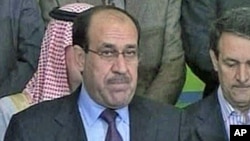Iraq's Electoral Commission is preparing for a manual recount of ballots cast in Baghdad during the March 7 parliamentary elections. An Iraqi court announced the recount on Monday after Prime Minister Nouri al-Maliki claimed widespread vote fraud in Iraq. Initial election results showed former Prime Minister Ayad Allawi's Iraqiya coalition won the largest amount of seats in the 325 member parliament, but just two more than Mr. Maliki's State of Law bloc.
More than 2.5 million votes were cast in Baghdad during the parliamentary elections - that's more than 20 percent of Iraq's population.
Overall, Ayad Allawi's Iraqiya bloc gained 91 seats and Prime Minister Maliki's State of Law coalition took 89. But in Baghdad, Prime Minister Maliki won two more seats than Mr. Allawi. Both men are Shi'ite. But Mr. Allawi's party won a majority of Sunni votes.
The prime minister's alliance claims there were voting irregularities in Baghdad and elsewhere in Iraq. But international observers say the election was fair.
An Iraqi electoral commission official says the ballot recount is to begin on Saturday, with 11,000 polling stations, and should take no more than 10 days.
Rend al-Rahim spoke about the recount at a forum in Washington on Iraq's elections. She was a candidate for Iraqiya in the parliamentary elections and heads the private Iraq Foundation in Washington. She thinks the recount will have a negative impact on Prime Minister Maliki.
"I think a lot of political parties are going to see this as a very dangerous move by Maliki that threatens all of them - that he is bending the rules, bending the law, he's rewriting the election rules," said Rend al-Rahim.
Al-Rahim also contends the recount decision was due to pressure from the Maliki government, not just his coalition, which dismisses those allegations.
"He is trying to manipulate the process in order to get a higher number of seats in the parliament," she said. "And the reason he wants to do that is in order to have the unquestionable, unassailable right to form the government. He's been resisted, so far, by the major parties who do not want him to be prime minister."
No matter what the outcome, neither Prime Minister Maliki's alliance nor Mr. Allawi's bloc will have enough seats to form a government on its own. But the party with the most seats in parliament will take the lead in forming a coalition government.
Joost Hiltermann with the independent International Crisis Group, says the recount is politically dangerous.
"If it is seen as favoring Mr. Maliki that will be highly problematic," said Joost Hiltermann. "I don't see why then Mr. Allawi would accept those results, and it could lead to instability and possibly violence."
Hiltermann says the controversy over the election results could make it longer to form a new government, and could lead to security problems.
"You have the threat that the security forces may start to fracture because loyalties are quite uncertain still within the security forces, whether they are to work with the state or towards political leaders with heads of political blocs of often ethnic or sectarian character," he said. "And if the security forces start fracturing, then we're in a pre-civil war stage."
Mr. Allawi has warned that if his victory is overturned, there will be very big problems in Iraq.
Iraq's Parliamentary Election Votes to be Recounted in Baghdad




